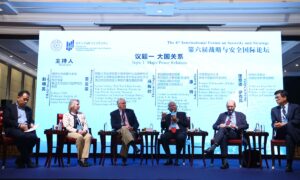I intend to take a global perspective, from Australia and to focus on what you might think is an unexpected and also practical suggestion for co-operation involving China, the US, Australia and other significant nations. Frankly, we have no choice. As our moderator, General Zhou Bo has said when referring to the global commons that is outer space, we are living through an era of ‘mutually assured vulnerability’.
My proposal is for the remaking of global governance as it impacts on climate change and the preservation of nature. This will require the fullest cooperation of China and the United States, along with others, for which we have seen encouraging signs in recent times. Let me begin with short anecdote involving the legendary American statesman, the late Henry Kissinger. This story is probably true, as Dr Kissinger verified it to me some years later.
Once, an Australian Foreign Minister said to Kissinger in a meeting in Washington: ‘Henry, you really ought to visit Australia sometime when you are passing through’, to which Kissinger immediately replied: ‘I’ll keep it in mind next time I’m visiting Antarctica!’
Now this funny little story says a few things, including something about Australia’s geographic location, along with New Zealand, at the bottom of Asia and the Pacific. Australia is separated only by the vast and cold Southern Ocean from the massive continent of Antarctica – the 5th largest on earth, a land mass twice as large as Australia, home to millions of penguins and seals and to a few thousands of visiting scientists – and increasingly tourists – from around the world.
To remind you of how important Antarctica is to the whole of the environment of the planet, I ask you consider this: if all the ice covering Antarctica should somehow melt, it would raise global sea levels, everywhere, by 60 metres.
As you will all know, Antarctica is governed not by one sovereign nation but by a remarkable and somewhat fragile treaty, binding all nations together around the concept of science and the shared preservation of this most precious and special corner of the world.
Antarctica is in Australia’s neighbourhood and has ranked as an important shared strategic responsibility in public and political consciousness in Australia for many decades.
China, as with the US, European, Russian and Latin American powers, has growing interest and involvement in Antarctica. However, will all of these powers continue to act with goodwill and in the interests of nature and conservation?
Instead, might there be a concerted, practical effort to bind all interested nations into a permanent, shared governance system for Antarctica, which will serve to protect this fragile continent in perpetuity and would also serve as a model of modern win-win co-operation between great powers?
If you are doubtful that this is possible, then consider this: last year, the most significant nations on earth managed to agree to the United Nations High Seas Treaty, to protect 30% of the world’s oceans, the international waters beyond sovereign jurisdiction, by 2030.
This is a major global achievement and shows that co-operation is both possible and necessary on matters affecting the global commons. Against a tide of suspicion and mistrust, the world – yes, including the United States and China – managed to unify around this issue.
Speaking of the need for optimism and global co-operation now more than ever, in the face of universal threats to our ‘common home’, we at the Global Foundation are mobilising a concerted global plan of action, to strengthen global governance as it relates to action on climate change and nature. This mobilisation is intended to impact on many aspects of the global commons, including: Antarctica, tropical forests, and reform of the international financial system to make it more possible to marshal the trillions of dollars of private sector investment that are required to sustain our planet for the future.
We are not just speaking from the sidelines, urging governments to do more, collaboratively. Yes, that of course is important, but we are now living in such a fluid time, filled with uncertainty and lacking in clear leadership, that we have decided to do our best to bring together a team of talents and influence from across the world – the global South and the global North, East and West, from business and investors, from academia, global institutions, faiths and civil society. We are offering to work with governments in partnership, to address these massive challenges, harnessing optimism and the best in the world. Frankly, we have no choice, the task is huge and time and possibly history is against us!
To highlight how a fresh approach is needed, for a more just and inclusive world, the Deputy Secretary General of the United Nations addressed us recently and encouraged our actions. She said: ‘The current system’s failure to address environmental challenges and social inequalities is essentially pushing humanity towards a breaking point’.
We will bring together key people for a series of global meetings around the world, starting with Beijing in late May. In many ways, the meeting in Beijing will be a return to where much of our engagement for global co-operation on climate and nature began, way back in April 2008, when we hosted Australian Prime Minister Kevin Rudd and China’s new Minister for Climate Change, Xie Zhenhua. They found common purpose and on we went to Washington, to bring China and the US closer on the matter.
Let me re-emphasise a fundamental point, something I have said for many years: there can be no global agreement on matters such as climate change and nature without China being centrally involved, along with others, in shaping the solutions. In fact, this might well be China’s moment to shine, to demonstrate positive global outcomes for the planet through collaborative international leadership.






